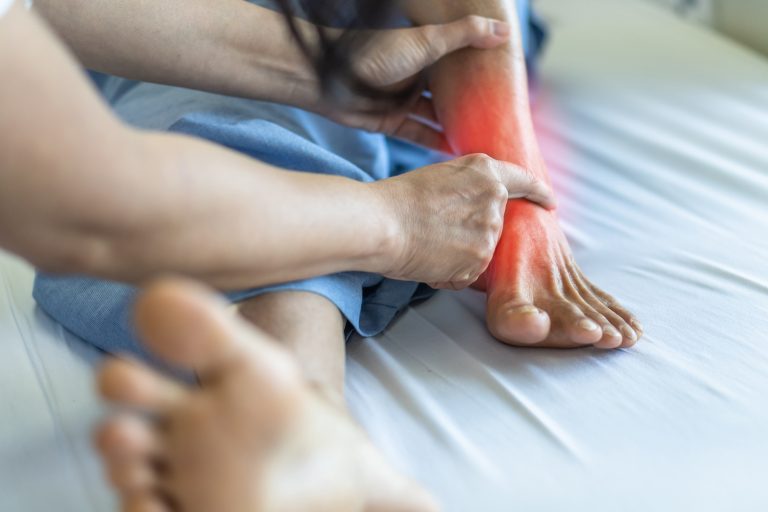Understanding Nerve Damage
Nerve damage, or neuropathy, is one of the most frustrating conditions because it is incredibly difficult to manage. Unlike a broken bone or another orthopedic condition, there is not one simple answer that can provide patients with relief. The peripheral nervous system is incredibly complex, making it difficult for doctors to offer a specific treatment that will guarantee relief. While some patients can find some relief through the use of medications and other conservative therapies, there is often not a specific treatment approach that solves the core issue.
Many patients with this condition believe that the nerve pain will go away on its own – and in unique cases, it will. Although repair is not necessarily possible, regrowth can occur, providing patients with sufficient relief from their discomfort. Our nerves have the instinct to repair themselves once damaged, but it can be a slow process, and significant damage is often irreparable.
What Causes Nerve Damage
As briefly mentioned earlier, severe nerve damage can be caused by various conditions, injuries, and infections. Individuals with high-risk conditions like Diabetes must be aware of the potential of nerve damage so they can optimize their lifestyle for prevention. At BEST Health System, we have witnessed the impact of patient education and we are dedicated to keeping all patients in the know about the risks of certain medical conditions.
Common Conditions at Risk for Nerve Damage
If you have been diagnosed with a specific medical condition, it is very important to understand the ins and outs of it. This way, you are aware of certain risks and can make small changes to protect yourself from potentially developing any extent of nerve damage. Nerve damage is often recognized in patients with the following conditions:
- Diabetes
- Autoimmune disorders such as lupus or rheumatoid arthritis
- Thyroid problems
- HIV or AIDS
- Kidney disease
- Other conditions
Aside from these diagnosable conditions, there are other reasons why an individual may develop nerve damage. Traumatic injuries such as falls or car accidents may result in nerve damage that is difficult to repair. Additionally, neuropathy is also found in patients who overuse alcohol or certain drugs.
As you can see, nerve damage can result from almost anything and it is incredibly difficult to productively manage. If you have not been diagnosed with any of the listed conditions, but are concerned about preventing nerve damage, the best thing you can do is follow a healthy lifestyle enriched with mindful eating, exercise, and limiting alcohol and drug use.
Making Lifestyle Changes to Prevent Nerve Damage
Although we wish there was a simple answer to preventing nerve damage, it truly comes down to how patients choose to live their lives. Patients who opt for a nutritious diet rich in antioxidants and vitamins are less likely to develop a disorder such as neuropathy. If you are interested in learning about curating a healthy, nerve-safe diet, visit our blog on following a nerve-healthy diet.
Maintaining an active lifestyle is another excellent way to stay healthy and prevent nerve damage. Introducing a combination of cardio, weight-lifting, and stretching can improve blood flow and oxygen delivery to the nerves, ultimately improving function and nerve health.
Commonly Recommended Conservative Therapies for Nerve Damage
Medications
Depending on the type of neuropathy and the region it has manifested, doctors will recommend a combination of conservative therapies. Oftentimes, many doctors will prescribe medications such as antidepressants and anticonvulsants. These drugs function differently but are known to minimize symptoms of chronic pain and allow patients to function more comfortably.
Physical Therapy
Patients with neuropathy often experience radiating pain in the extremities, typically in the legs and feet. This can make it increasingly difficult for patients to do many physical activities, and can even make walking painful. Physical therapy is recommended for these patients to help them regain function, gain stability, and build muscle.
At-Home Therapies
Many patients can achieve partial pain relief through the use of at-home therapeutic methods. Although it is always recommended that patients seek professional help after a neuropathy diagnosis, there is nothing wrong with supplementing these treatments with attainable at-home relief methods. Alternating hot/cold compresses, massage, and stretching are excellent options for controlling debilitating pain.
When Surgical Intervention Becomes Necessary
If patients continue to experience severe nerve pain after trying a range of conservative therapies, they may begin to think about surgical intervention. Certain types of neuropathy can benefit from a procedure called a nerve graft, which is a surgical procedure that reconnects a damaged nerve. Unfortunately, this procedure is not beneficial for all kinds of neuropathy, and in those cases, a different approach is recommended.
Spinal cord stimulators (SCS) are implanted medical devices that prevent pain signals from reaching the brain. This treatment is commonly recommended to patients with peripheral neuropathy and painful diabetic neuropathy who experience radiating pain along the legs and feet. 70% of patients who get a spinal cord stimulator achieve significant relief and can manage their pain.
Spinal Cord Stimulator Treatment with BEST Health System
At BEST Health System, we have witnessed the effects that nerve damage has on patients. Therefore, we are proud to offer a premier solution to patients who suffer from relentless, debilitating pain: spinal cord stimulator treatment.
We understand that undergoing any surgical procedure can be nervewracking, and is a huge decision. Therefore, we encourage our patients to undergo a trial period where they can try a spinal cord stimulator to see how it manages their pain. Most of the time, patients who undergo the trial period experience significant relief and opt to undergo the implant procedure for permanent, lasting relief.
Are you interested in learning more about spinal cord stimulator trials with the experienced doctors at BEST Health System? Contact us today for more information.
